To Benidorm’s beaches and back in a day: a popular trip for Madrid’s Latino communities
Those short on time and with low budgets are opting for organized bus trips that whisk them to the coast in the early hours of the morning and return them to the capital within 24 hours

Every morning, the Poniente beach in Benidorm, eastern Spain, bears witness to a race among beachgoers as they compete to plant their umbrellas as close to the sea as possible. This Saturday, as happens often, the winners are the passengers on the Miluzka Arias Playero Viajero bus. The vehicle left Madrid at midnight and arrived in the Alicante municipality at 6.30am. The sound of flip-flops slapping on the ground breaks the silence on the Avenida Rei Jaume I, which runs all the way to the seafront. The passengers are carrying cool boxes, baby strollers and little speakers to play their music on. None of them have been able to sleep. Many boarded the bus after finishing their working day in hospitality, on construction sites or taking care of children and seniors. But none of that matters – their prize lays before them. A beach all to themselves as the sun comes up.
Teodora Rojas, 53 and from Bolivia, has not been to the beach since 2012. “It’s beautiful, but my head is pounding because I haven’t been able to sleep a wink,” she says, with her cellphone in her hand after taking a photo at the steps that lead down to the sand. She is accompanied by a couple of Peruvian friends, who convinced her to come because they could see that she was depressed in Madrid this summer. Since her children moved out of her home, Teodora spends a lot of time alone. Her days are spent at work, where she takes care of seniors, and looking after the plants in her small flat in the east of the Spanish capital.
The excursions allow for migrants residing in Madrid to get to know their adoptive country
The two friends who accompany her, Ynes Arce and Elizabeth Salvador, have a lot more experience as travelers. Every weekend in the summer they scour Facebook pages and WhatsApp groups in search of options to get to the coast, in buses like Miluzka Arias’s one, which travels back and forth on the same day. This trip cost them €35. Organizer Miluzka gives them 10 hours to enjoy Benidorm at their leisure. As they leave the vehicle, they are reminded that the return trip will be at 5.30pm from the same point.
“With Miluzka we have a good time because we form groups,” explains Arce, 63. “Sometimes we sing or dance, you come together wherever you are and you have a really good time, which is why we come back.” She is spending her savings on travel. As a carer, she earns €850 a month net, which she supplements by giving private math classes. Like her, many people do whatever they can to get out of Madrid.
With 40ºC temperatures in the Spanish capital, Miluzka has had no problem selling the 50 seats on the bus, which she hired from the company T-Bus, owned by Juan Aguilar from Madrid. To turn a profit, she needs at least 40 passengers. Over the week, she sends messages via social media. “Hello friends of the Bus Playero Viajero. We remind you that we have very few seats available,” she writes, along with the list of destinations for the coming Wednesdays, Saturdays and Sundays: Cullera, Gandía, Benidorm… In her messages, she explains why there are trips on Wednesdays: “We are always thinking of you, the people who have weekdays off work.”
When the bus halts halfway through its journey at the Parador Moya truck stop, it is clear to see how big this market is
These trips are not just for the summer – once the heat of summer is over, the beach is swapped for the mountains. The excursions allow for migrants residing in Madrid to get to know their adoptive country. “The bus that visits the beautiful cities of Spain,” is one of its slogans. Miluzka was born 41 years ago in Peru and has spent 20 years organizing these trips. Her and her ex-husband had just arrived in Madrid and were inspired by similar buses that run in Lima, she explains. Other organizers are perhaps more permissive when it comes to music or alcohol, but she has her rules in order to create a peaceful and respectful atmosphere. Many families with children buy tickets for her trips, as do senior women. Nearly all are of Latin American origin.
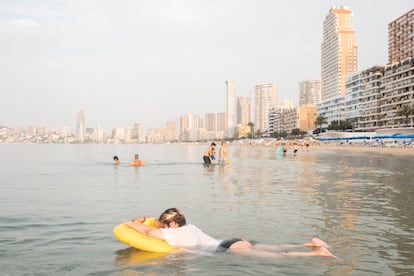
According to Miluzka, they were the only ones in the market offering these cheap day-return trips. Around the year 2012, the business had grown so much that they would run five buses a night. But the success caught the attention of other immigrants in Spain, who have since become the competition. The popularity is clear to see during the nighttime route the bus takes through Madrid, as it collects passengers. In Ciudad Lineal, Avenida de América and Atocha, people approach the bus to see if it is theirs.
“Is this Vicente’s bus?” one would-be passenger asks.
“Nooo, we are from the Bus Playero Viajero.”
A youngster approaches with a different question. “Do you often travel to the beach?” he asks the journalist. He wants to steal Miluzka’s customers. There’s a fierce battle for this market, but the margins are very small. Miluzka sometimes makes a loss, with the bus half-empty. “I have had to pay out of my own pocket, because I can’t lose my customers. It’s an investment,” she explains. Miluzka is nearly always accompanied on the trips by her three children: Andrea, 14; Eros, 13 and Florentina Miluzka, two. Her current partner, Mario Baltodano, also goes with her.
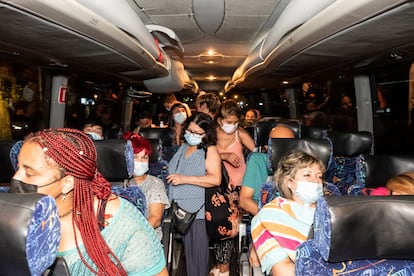
Thanks to the Bus Playero Viajero, Miluzka has also managed to secure her other “baby,” a café called DisFruta that offers juice and sandwiches next to Alcalá street in Madrid, in the Pueblo Nuevo neighborhood.
When the bus halts halfway through its journey at the Parador Moya truck stop, it is clear to see how big this market is. There are a dozen or so buses parked up, and hundreds of Latin American passengers who have disembarked to use the restrooms or buy refreshments. The owner of the truck stop, José María Moya, says that in the early hours during the summer as many as 30 “Latin buses” from Madrid can call in. The business is welcome while senior trips remain suspended due to the coronavirus pandemic.
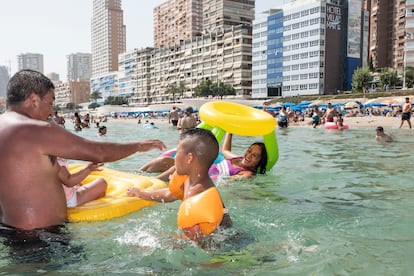
Part of the higher traffic this summer is also due to the health crisis, with many opting not to travel after the first Covid-19 wave last summer due to fear of infections. Finally, many Madrileños of humble means have been able to take a dip in the sea once more.
The owner of the buses, T-Bus, has seen this business grow over the last 10 years. They rent out vehicles to organizers from the Peruvian, Ecuadorian and Filipino communities, and who generally attract passengers of the same nationality. “There are more and more immigrants in Madrid and many are unable to take a week or two weeks of vacation,” explains the owner, Aguilar. “So this is an inexpensive way of going to the beach. These collectives are very well organized and bring together a lot of people.”
Aguilar’s parents were Spanish immigrants who lived in Switzerland, where they worked in hospitality. “They have told me stories about how they also organized leisure activities with other Spaniards,” he explains.
The day in Benidorm flies by. A couple of hours after the Bus Playero arrives, and there is barely any more room on the beach for umbrellas. The public on the Poniente beach is mostly of Spanish origin. Many have been coming here their whole lives in the summer. But the arrival of Latin American visitors is starting to change the character of the beach, as it is in many other areas of the more affordable areas of the economy. You can see this on the Madrid Metro system, at municipal swimming pools and in public schools.
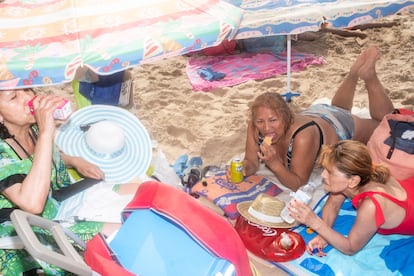
At lunchtime, the passengers from the Miluzka bus who haven’t brought their own food seek out budget options on the Benidorm seafront, ranging from a roast chicken or Burger King fast food, to an €11 set menu.
For some, this will be the first and last time that they travel to the beach this summer. Jaime Espinoza, 42, hadn’t left Madrid for the last five years. Every year he has either been short of time or of money. This year, the problem was the latter. He’s been unemployed since May, when he lost his job in a warehouse, and he can’t allow himself many luxuries. Thanks to the low-cost bus trip, he’s been able to escape for a day to Benidorm, a beach that holds good memories for him.
He used to work in this municipality 21 years ago, laying tiles in the Terra Mítica theme park before it opened. At night, he would go out to the nightclubs on the seafront. He remembers the names and he points to where they are from the beach. “That’s the disco Alone, further up is the Picasso, on the right is Ku and the bigger nightclubs are further up… We would finish work and we’d all go together; by car and with money in our pockets.” He would get paid in pesetas – these were the times of the construction boom. Things have changed, however, and recent years have been tough for him.
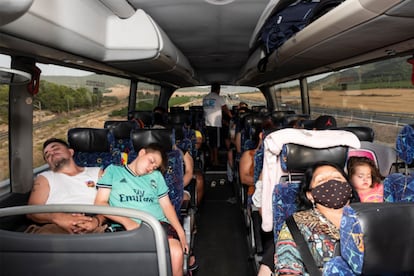
By mid-afternoon, Miluzka’s day-trippers are the first to collect their things. The organizer needs to be in Madrid by midnight, in time to collect the passengers for Sunday’s trip. She’ll be getting off this bus to board another one, with no break. This time they’ll be heading to Oropesa del Mar, with an entirely new group apart from two female passengers who will accompany her from today’s excursion.
They are Rosa Osorio, 60, and her daughter. Rosa wants to take advantage of her completely free weekend. She works as a housekeeper in Madrid. For €70 she has been able to enjoy a full weekend at the beach.
She doesn’t seem tired, despite the effort. Nor does Miluzka, who will be able to rest in a proper bed come Monday. “She ends up sleeping like a log all day!” jokes her eldest daughter.
English version by Simon Hunter.
Tu suscripción se está usando en otro dispositivo
¿Quieres añadir otro usuario a tu suscripción?
Si continúas leyendo en este dispositivo, no se podrá leer en el otro.
FlechaTu suscripción se está usando en otro dispositivo y solo puedes acceder a EL PAÍS desde un dispositivo a la vez.
Si quieres compartir tu cuenta, cambia tu suscripción a la modalidad Premium, así podrás añadir otro usuario. Cada uno accederá con su propia cuenta de email, lo que os permitirá personalizar vuestra experiencia en EL PAÍS.
¿Tienes una suscripción de empresa? Accede aquí para contratar más cuentas.
En el caso de no saber quién está usando tu cuenta, te recomendamos cambiar tu contraseña aquí.
Si decides continuar compartiendo tu cuenta, este mensaje se mostrará en tu dispositivo y en el de la otra persona que está usando tu cuenta de forma indefinida, afectando a tu experiencia de lectura. Puedes consultar aquí los términos y condiciones de la suscripción digital.








































